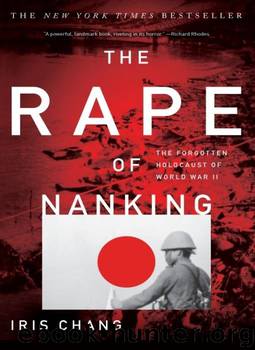The Rape of Nanking by Iris Chang

Author:Iris Chang
Language: eng
Format: epub
Publisher: For the Benefit of Mr. Kite
Published: 1996-12-31T16:00:00+00:00
The next morning Rabe awoke to the sound of yet another air raid. Apparently not all of the Chinese army had been forced from of the city, he thought. It was only 5:00 A.M., so he lay down again. Like most people in the city, Rabe had become so jaded by air raids that the blasts no longer bothered him.
Later that morning Rabe explored the city to check out the extent of the damage. In the streets lay numerous Chinese corpses, many of them civilians who had been shot in the back. He watched a group of Japanese soldiers push their way into a German coffeehouse. When Rabe chastised them for stealing, pointing to the German flags on the house, an English-speaking Japanese soldier snapped: “We are hungry! If you want to complain, go to the Japanese embassy. They will pay for it!” The Japanese soldiers also told Rabe that their supply column had not arrived, and they could not count on the column for any nourishment even if it did arrive. Later Rabe learned that the soldiers looted the coffeehouse, then set it afire.
Worse was to come. In the distance, Rabe saw Japanese soldiers marching north from the south side of Nanking to occupy the rest of the city. To avoid them, he immediately drove north and reached the main street of the city, Chungshan Road, stopping at the Red Cross hospital in the Foreign Ministry. The Chinese staff had fled the premises, and bodies were everywhere – clogging the rooms, corridors, and even the exits from the hospital.
That day Rabe encountered the remains of the Chinese army – hungry and exhausted stragglers who had failed to cross the Yangtze River to safety. Driving through Shansi Road Circle, he met four hundred Chinese troops, all of them still armed, marching in the direction of the advancing Japanese army. It was then that Rabe had a sudden “humanitarian impulse” that was to haunt his conscience for months, if not years, afterwards. Warning them about the Japanese troops to the south, Rabe advised the Chinese soldiers to throw away their machine guns and join the refugees in the Safety Zone. After a short discussion, they agreed and followed Rabe into the zone.
Similarly, when hundreds of Chinese soldiers found themselves trapped on the northern side of the city, unable to secure passage across the river, many broke into the Safety Zone, begging the American and European administrators to save their lives. The committee members were uncertain as to whether they should help them. After all, they had created the zone as a sanctuary for civilians, not soldiers. The committee tried to resolve the dilemma by addressing the issue with Japanese army headquarters but got no further than a captain on Han Chung Road.
Moved by the plight of the soldiers, the committee eventually caved in to their pleas. Like Rabe, they told the soldiers that if they laid down their arms, the Japanese might treat them mercifully. Then they helped the soldiers disarm and housed them in various buildings within the neutral area.
Download
This site does not store any files on its server. We only index and link to content provided by other sites. Please contact the content providers to delete copyright contents if any and email us, we'll remove relevant links or contents immediately.
| Holocaust |
Cecilia; Or, Memoirs of an Heiress — Volume 1 by Fanny Burney(31499)
Cecilia; Or, Memoirs of an Heiress — Volume 3 by Fanny Burney(31072)
Cecilia; Or, Memoirs of an Heiress — Volume 2 by Fanny Burney(31014)
The Secret History by Donna Tartt(16871)
Sapiens: A Brief History of Humankind by Yuval Noah Harari(13240)
Leonardo da Vinci by Walter Isaacson(12046)
The Radium Girls by Kate Moore(11017)
Sapiens by Yuval Noah Harari(4696)
How Democracies Die by Steven Levitsky & Daniel Ziblatt(4519)
The Wind in My Hair by Masih Alinejad(4485)
Homo Deus: A Brief History of Tomorrow by Yuval Noah Harari(4352)
Endurance: Shackleton's Incredible Voyage by Alfred Lansing(3941)
The Silk Roads by Peter Frankopan(3888)
Man's Search for Meaning by Viktor Frankl(3777)
Millionaire: The Philanderer, Gambler, and Duelist Who Invented Modern Finance by Janet Gleeson(3660)
The Rape of Nanking by Iris Chang(3616)
Hitler in Los Angeles by Steven J. Ross(3510)
The Motorcycle Diaries by Ernesto Che Guevara(3422)
Joan of Arc by Mary Gordon(3357)
